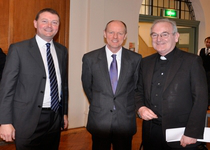Academy Status offer Catholics 'far more threats than opportunities'

l-r Paul Barber, Nick Gibb MP, Bishop George Stack
The options available to Catholic schools in the Government's Academy Schools Programme was the main topic of the Diocese of Westminster's Primary and Secondary Headteachers Conference, held on 6 July 2010 in Westminster Cathedral Hall.
Speaking at the Conference, Nick Gibb MP, Minister of State for Schools, outlined the Government's support for faith schools. He also discussed some of the ways in which he hoped it would be possible for Catholic schools to become Academies, and said that discussions with the Catholic Education Service on the place of Catholic schools in the Academies system were continuing.
Admitting that there were particular concerns about governance, autonomy, staffing and land ownership, Nick Gibb said: "Becoming an Academy will not change the religious character of a school, faith designation continues into an Academy. When a school has an existing Foundation, as is the case with all faith schools, they must obtain the consent of their Foundation before they convert to becoming an Academy. Members of the Foundation, or the Trust, will become the members of the new Academy Trust which will then appoint the majority of governors.
"We don't want to change the number of faith places available to local parents for their children and when an Academy replaces existing provision, schools can continue to give priority to children of their faith. Faith Academies will also be able to take into account the faith of teaching staff, just as voluntary aided schools can now."
Pros and Cons
The Conference also heard from Paul Barber, Director of Education for the Diocese of Westminster. In an analysis of the current situation surrounding Academy schools, he presented the pros and cons of the new Government's proposals and how these might affect Catholic schools in the diocese.
Paul Barber revealed that far more threats than opportunities about Academy status had been identified by schools in the diocese which had taken part in a survey about Academy Schools. Increased funding was one of the opportunities which schools had identified, but Paul Barber suggested that although extra money could be available in the short term, there was no guarantee that funding would continue to be generous in the long term for Academy Schools.
Paul Barber said: "This could possibly be the change that is as significant as the momentous changes in 1945, 1902 and 1870. If that is to be the case, then we as a church need to deliberate carefully together and to work out which path we take. We are very lucky in the way that our predecessors managed to get the deal we have at the moment and we need to be careful that we don't throw away anything that has been gained after long and hard struggle."
Distinctiveness of Catholic schools
Opening the Conference, Archbishop Vincent Nichols said that it was important for Catholic schools to "clarify their distinctiveness" in a period of change in the education system.
'"The vision and purpose of our enterprise", Archbishop Nichols said "is a recognition that our work is based on a partnership with public bodies, with the Catholic church and with the creative and redemptive work of God."
He concluded by quoting a Meditation by Cardinal Newman, written in the 1850's for the boys of the Oratory School in Birmingham.
'God has created me to do him some definite service; he has committed some work to me which he has not committed to another. I have my mission - I may never know it in this life, but I shall be told it in the next.
I am a link in the chain, a bond of connection between persons. He has not created me for naught. I shall do good. I shall do his work.; I shall be an angel of peace, a preacher of truth in my own place, while not intending it, if I do but keep his commandments and serve him in my calling.
Therefore I will trust him. Whatever, wherever I am, I can never be thrown away. If I am in sickness, my sickness may serve him; in perplexity, my perplexity may serve him; if I am in sorrow, my sorrow may serve him. My sickness, or perplexity, or sorrow may be necessary causes of some great end, which is beyond us. He does nothing in vain; he may prolong my life, he may shorten it; he knows what he is about. He may take away my friends, he may throw me among strangers, he may make me feel desolate, make my spirits sink, hide my future from me - still he knows what he is about.'
Source: Archbishops House















